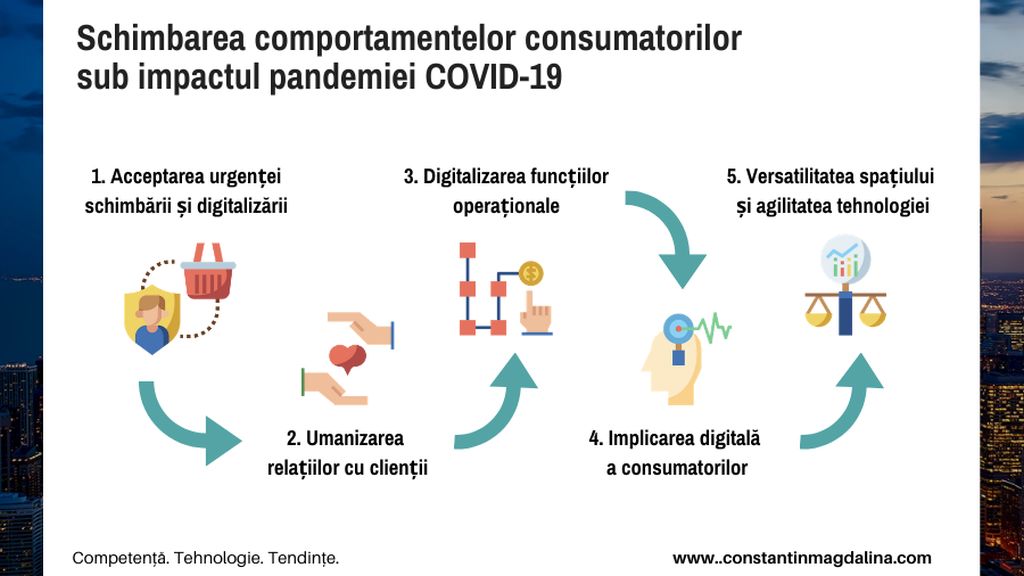
Consumer behavior is changing at an unprecedented rate. Forced access to the online environment by searching for and purchasing products or services changes their habits. The digital transformation of companies is thus becoming necessary now for their survival.
Following the pandemic, employees and service companies will have to manage the new attitudes and behaviors of consumers, who prefer the online environment. To enable solutions and support relevant consumer experiences, leaders need to involve team members much more. The most appropriate mechanisms for doing this are described below.
1. Accepting the urgency of change and digitization
Accessing online channels at an unprecedented level changes the rules of consumer involvement. Their basic expectations about the digital experience have changed.
There is no going back for companies. Digital customer involvement is not just about a website, transactions, and payment methods, but much more than that. It means employees who are online brand ambassadors, automation, interactions on professional platforms, artificial intelligence (AI), and social media, collecting customer feedback and ratings. It also means marketing and PR, customer relations, open data, internal and external communication. In short, the use of digital tools and techniques to find, listen to and mobilize a community around an event, product, or company.
2. Humanizing customer relationships
The exceptional origin of this crisis - the health crisis - imposed exceptional measures on companies. Before the crisis, for many companies, working from home was unthinkable. Today it is the most frequently accessed option. Under these circumstances, the boundary between the various functions of customer relations has been erased.
Service or sales lines have set aside the strict definition of the job description to ensure the continuity of service delivery to customers. The outcome? Rethinking organizational design in an integrated and versatile way and redefining the role of employees at all points of interaction with the consumer. The main objective of companies is to maintain customer relationships in a Human-To-Human approach.
3. Digitalization of operational functions
This crisis has highlighted the importance of the distribution chain and the shortcomings or limitations of continuity plans. The operational function needs digitalization to reduce costs, but especially to ensure transparency and access to information in real-time.
Facing changing consumer purchasing behavior - the preference for online - companies are forced to adapt their physical spaces, work platforms, data usage, and recalibrate their investments vs. revenues. Companies that have invested in digital solutions and digital skills of personnel have managed the crisis better than companies that have not made that investment.
4. The future of consumer involvement
With the help of technology, companies identify the points that deserve investment and those who do not in the interaction with consumers in the digital universe. A dashboard that integrates and compares data, helps companies anticipate demand and drive growth. An example is a hybrid between the physical and the virtual world of the “contactless” type. From payment and delivery to telemedicine and augmented reality, we can run processes that do not involve direct contact.
Another relevant aspect of consumer involvement is the cross-generational workforce. The predictability of the work schedule, suitable for generation X and its flexibility, appreciated by generation Y, combine very well to provide services 24/7 for different types of consumers through complex digital platforms.
5. The versatility of physical space and the agility of the technology
To optimize costs, but also for relevance, companies re-evaluate their need for office space. Even if collaborative workspaces optimize the space needs of companies, they must provide new standards of hygiene because the health safety of employees is a priority.
Technology must, therefore, play a more important role in companies' facilities. From contactless control of lighting systems, ventilation, access, etc. to screens and plasmas for easy indoor communication with employees, digitization brings efficient solutions. By ensuring safe workspaces with access to the state-of-the-art technology, companies make possible a positive experience for both employees and consumers.
The pandemic has temporarily disrupted consumer behavior. Conditioned by the restrictions imposed, consumers have shaped their habit of buying and paying online. The purchasing reflexes in the offline environment have not disappeared only from the pie of the consumer market, an increasing slice belongs to the online environment.
About Constantin Magdalina
Constantin Magdalina has 10 years of working experience, while he performed in multinationals both in Romania and abroad. Constantin has a master’s degree in Marketing and Business Communication at the Academy of Economic Studies Bucharest. He is certified Lean Six Sigma and ITIL which provide him a good understanding of processes and transformations within organizations. The Chartered Institute of Marketing certification furthered on complemented his expertise and knowledge in business. In those over 4 years working activity in a Big4 company, he initiated and conducted studies which analyzed different aspects related to the business environment in Romania such as the economic growth predictions of companies in 2013-2016, knowledge management, the buying experience in the age of digital consumers, social media 2013-2015, the utilization of mobile devices in Romania. He is the author of numerous articles on topics related to innovation, the efficiency of business processes, social media, the consumers’ buying experience in the age of digital, trends and emergent technologies. He is invited as a speaker at numerous events and business conferences.

































